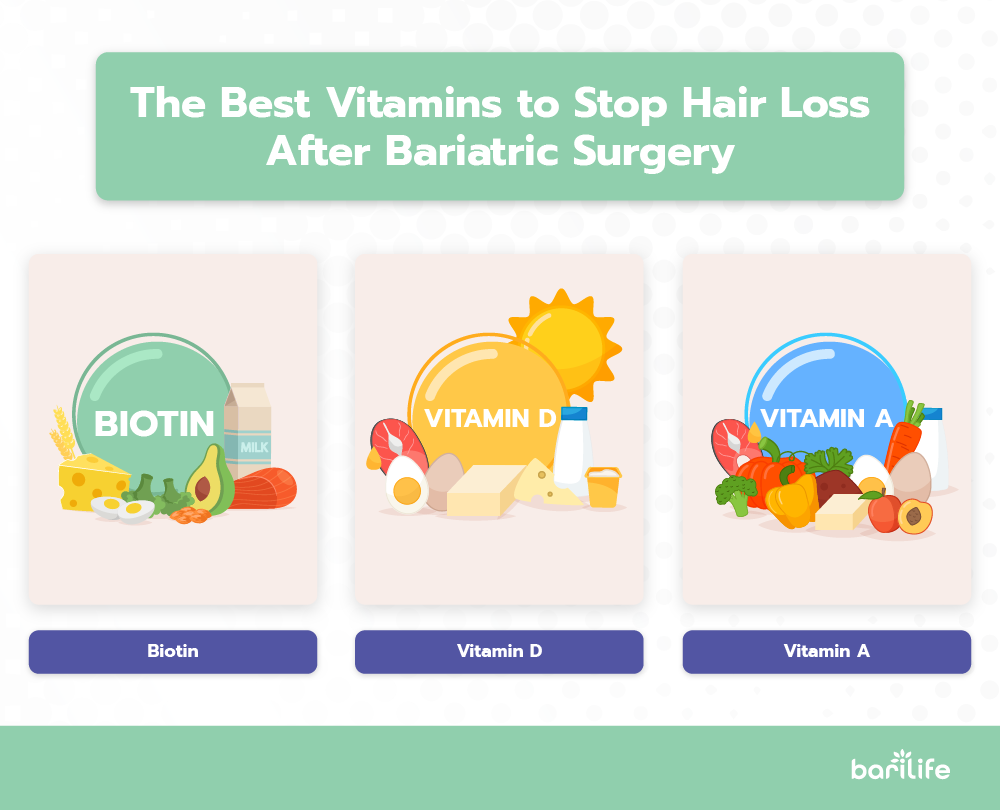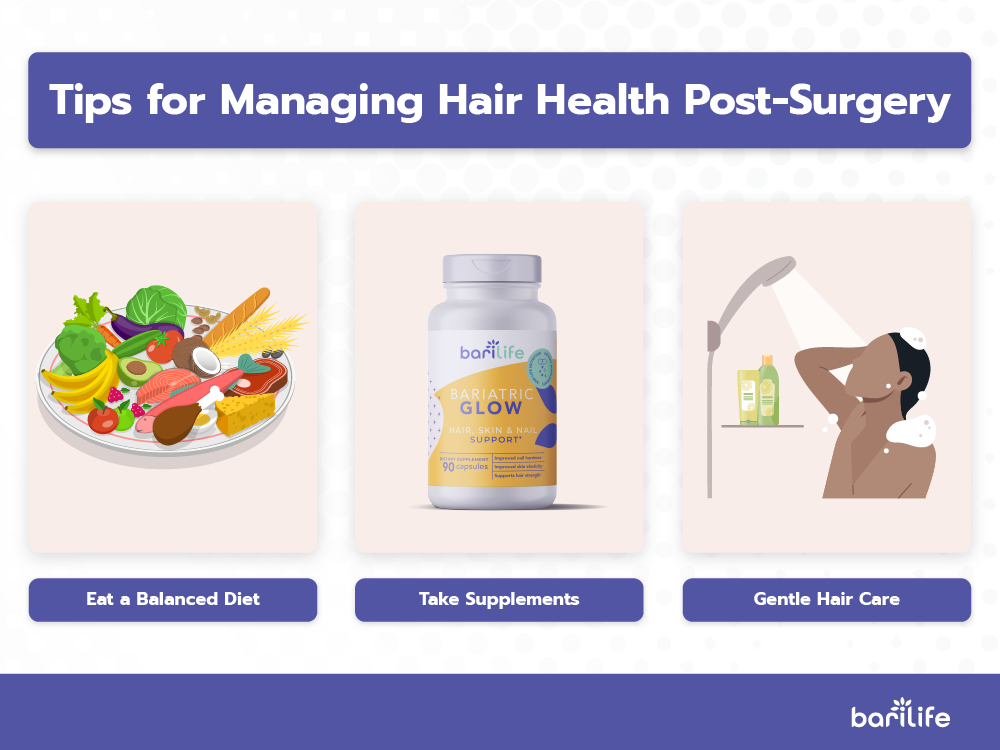It turns out that “losing it” after bariatric surgery can apply to both weight and hair. While you are probably enjoying shrinking your pant sizes, you may not be happy about your shrinking ponytail.
The good news is that taking the right vitamins can support healthy and strong hair.
This guide explores the causes of hair loss after bariatric surgery. More importantly, it shows you how to combat it with the right vitamins and minerals, including the best bariatric vitamins to ensure optimal hair regrowth.
Let’s get you feeling confident and fabulous from head to toe!
Table of Contents
Causes of Hair Loss After Bariatric Surgery
While bariatric surgery offers great benefits, it also temporarily alters your body’s natural balance, which can lead to hair loss.
One major culprit is when you develop a bariatric surgery vitamin deficiency. With the changes to your digestive system and microbiome (good bacteria in your gut), your body may struggle to absorb nutrients like protein, vitamins, and minerals. All these are required for healthy hair growth.
Some people also experience rapid weight loss, which can shock your system and temporarily stop hair growth.
Hormonal changes brought on by surgery can also disrupt your hair growth cycle, causing thinning hair and shedding.

Telogen Effluvium Explained
Telogen effluvium is the scientific term health professionals use to describe hair loss after bariatric surgery.
It’s a temporary condition that typically starts within the first three to six months after surgery and slows down or resolves one year after.
Research suggests that stress, illness, or nutritional deficiencies force the hair follicles into a resting phase. Instead of growing as usual, the hairs stop growing and eventually detach from the scalp, leading to diffuse thinning but rarely bald patches.
Diagnosing telogen effluvium is based on your medical history and the noticeable increase in daily shedding.
The good news you’ve been waiting for is that telogen effluvium is usually reversible once you address the underlying causes.
By supporting hair regrowth through proper nutrition and hair care, you can ditch your lint roller and get back to having good hair days.
Essential Minerals for Hair Vitality
To support your hair health after bariatric surgery, there are several minerals you’ll want to make sure are in your diet. Ensuring you choose the best bariatric vitamins for these nutrients can make a significant difference.
Iron
Iron helps produce hemoglobin, the protein responsible for carrying oxygen to your hair follicles. Not having enough iron in your diet can lead to anemia, a condition often linked to hair loss.
Foods high in iron include:
- Whole grains
- Turkey
- Beef
- Spinach
- Artichokes
- Leafy greens
- Lentils
Zinc
Zinc plays a crucial role in hair tissue growth and repair. Without enough zinc, you may experience hair shedding, slow growth, and scalp issues.
Foods high in zinc include:
- Oysters
- Beef
- Seeds
- Lamb
- Black beans
- Cheese
Selenium
Selenium is a trace mineral that plays an important role in hair health.
Studies suggest that prioritizing selenium intake helped reduce hair loss in people with alopecia and in people undergoing chemotherapy treatment.
Foods containing selenium include:
- Meats
- Vegetables
- Nuts
Magnesium
Magnesium contributes to overall hair follicle health and helps regulate calcium levels, which can promote hair growth. Incorporating the best calcium for bariatric patients is essential, as calcium is another critical nutrient needed to maintain strong bones and hair.
Foods high in magnesium include:
- Seeds
- Nuts
- Granola
- Lentils
- Potatoes

Tips for Managing Hair Health Post-Surgery
Now that you know what’s causing your hair loss and what minerals are essential, let’s discuss steps you can take to support healthy hair growth.
Eat a Balanced Diet
In addition to including the three essential hair minerals in your diet, prioritize eating lean proteins, healthy fats, and plenty of fruits and vegetables. If the taste of traditional supplements is a challenge, we have found including the best bariatric calcium chews goes a long way.
Foods like eggs, nuts, and leafy greens are especially beneficial for hair growth.
Take Supplements
If you’re struggling to meet your nutritional needs through your diet, talk to your health provider about incorporating supplements.
Supplements with key nutrients like vitamin B12, iron, and biotin can be especially helpful.
Is Hair Loss After Weight Loss Surgery a Common Condition?
If you’re experiencing hair loss after bariatric surgery, take comfort in knowing you’re not alone.
Studies suggest that roughly 50% of people experience hair loss after bariatric surgery. The hair loss typically starts within the first three to six months.
Your body has just undergone a significant change, and it’s focusing its energy in other areas.
While you may disagree with your body’s choices, hair growth may not be a top priority.
But rest easy knowing it’ll get back to normal hair growth over time.
The Best Vitamins to Stop Hair Loss After Bariatric Surgery
Certain vitamins can be your hair’s new best friends.
- Biotin: Also known as vitamin B7, biotin is a key player in producing keratin—the protein that makes up hair, skin, and nails.
- Vitamin D: Vitamin D is essential for supporting the healthy growth cycle of hair. Being deficient in vitamin D is linked with alopecia and other hair loss conditions.
- Vitamin A: Vitamin A plays a role in producing sebum, a natural oil that keeps your scalp and hair moisturized. However, balance is essential, as too much vitamin A can contribute to hair loss.

Bariatric Glow, Bari Life’s bariatric vitamins for hair loss, formulated by renowned bariatric surgeon Dr. Stephen Boyce, delivers a powerful blend of biotin, zinc, vitamin E, and other essential nutrients to promote healthy growth and radiance.
Join over 80,000 satisfied customers who have chosen our trusted formula to support their post-surgery journey. Order yours today and let your inner confidence shine through!
Finally, don’t underestimate the power of a little TLC.
Treat your hair gently by using mild shampoos and conditioners. If possible, reduce how often you wash your hair during the week.
Avoid using harsh chemicals on your hair, and try to minimize heat styling techniques, which can cause further damage.
By including these best bariatric vitamins all-in-one and best liquid vitamins for bariatric patients into your post-surgery routine, you can optimize your hair health and ensure you’re getting all the essential nutrients to prevent hair loss.

Conclusion
Addressing hair loss after bariatric surgery is manageable with proper nutrition, essential vitamins, and gentle hair care. Bariatric GLOW, formulated by Dr. Stephen Boyce, provides nutrients tailored for post-surgery recovery. With over 80,000 satisfied customers, this trusted formula supports healthy hair growth and helps restore confidence.




What are your tips and tricks to post-bariatric success?